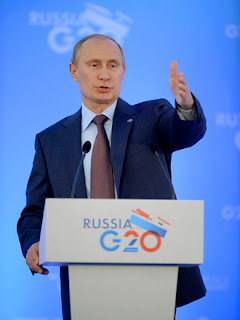September 6, 2013
http://rt.com/news/putin-g20-syria-meeting-511/
It's baffling to me how world leaders have the audacity to still try and justify going to war after what happened in Iraq, with up to 90% casualties being civilians. Combine that with a total lack of support by the people and it jumps from crazy to down right ludicrous in a nanosecond. I personally do not believe this war will happen. When a country lacks any support whatsoever from its people an unwarranted invasion of a foreign country has the potential of leading to total civil disobedience very quickly. This is why there is so much propaganda around fighting wars. They NEED support, it represents a crucial piece of the puzzle. If what occurred in Iraq didn't happen, with over one million deaths and no weapons of mass destruction, they may have been able to pull it off. Well sorry, it DID. When consciousness and awareness raises, a powerful and inner knowing illuminates within that ALL war is unjustifiable, which is what is now taking shape within the hearts and minds of the collective. ~BK
The alleged chemical weapons use in Syria is a provocation carried out by the rebels to attract a foreign-led strike, Russian President Vladimir Putin said at the G20 summit.
There was no 50/50 split of opinion on the notion of a military strike against the Syrian President Bashar Assad, Putin stressed refuting earlier assumptions.
Only Turkey, Canada, Saudi Arabia and France joined the US push for intervention, he said, adding that the UK Prime Minister’s position was not supported by his citizens.
Russia, China, India, Indonesia, Argentina, Brazil, South Africa and Italy were among the major world’s economies clearly opposed to military intervention.
President Putin said the G20 nations spent the “entire” Thursday evening discussing the Syrian crisis, which was followed by Putin’s bilateral meeting with UK Prime Minister David Cameron that lasted till 3am Moscow time.
Russia “will help Syria” in the event of a military strike, Putin stressed as he responded to a reporter’s question at the summit.
“Will we help Syria? We will. And we are already helping, we send arms, we cooperate in the economics sphere, we hope to expand our cooperation in the humanitarian sphere, which includes sending humanitarian aid to support those people – the civilians – who have found themselves in a very dire situation in this country,” Putin said.
Putin said he sat down with US President Barack Obama on the sidelines of the G20 summit and talked for about half an hour in “a friendly atmosphere”.
Although the Russian and the American leaders maintained different positions regarding the Syrian issue, Putin said they “hear” and understand each other.
Russian Foreign Minister Sergey Lavrov and US Secretary of State John Kerry will continue discussing the situation in Syria “in the short run,” Putin said.
Meanwhile, President Obama reiterated in his summit speech that the US government believes Syrian President Bashar Assad’s forces were behind the chemical weapons use.
Obama pledged to make a good case on the issue for both the international community and the American people, saying many nations are already “comfortable” with the US’ opinion.
While admitting “a number of countries” at the summit stressed any military action plan should go through the UN Security Council, Obama said the US is in a different “camp” that questioned the UNSC effectiveness.
“Given the Security Council’s paralysis on this issue, if we are serious about upholding a ban on chemical weapons use, then an international response is required and that will not come through the Security Council action,” Obama said.
'A dangerous precedent'
Both presidents stressed that the situation in Syria could create a dangerous precedent, but supported their points with contrasting arguments.
Obama stressed his “goal” and US “responsibility” was to maintain international norms on banning chemical weapon use, saying he wanted the enforcement to be “real.”
Putin, on the contrary, stressed that setting precedents of military action outside a UN Security Council resolution would mean the world’s smaller countries can no longer feel safe against the interests of the more powerful ones.
“Small countries in the modern world feel increasingly vulnerable and insecure. One starts getting the impression that a more powerful country can at any time and at its own discretion use force against them,” Putin said, citing the earlier statement made by the South African President.
Such practice would also make it much harder to convince North Korea to give up its nuclear program, Putin pointed out.
The meeting of the leaders of the major world economies - G20 - took place in St. Petersburgh, Russia. The participants of the summit focused on economic issues during round-table talks, including unemployment, the lack of global investment, and better international financial regulation. While on the sidelines the conversation shifted to the issue of the alleged chemical weapons attack in Syria and the possibility of military action in the war-torn country.



Something else is going on here. Obama is not a war hawk and he's not crazy. I know it sounds strange but I think his life (and/or his family's life) has been threatened. That's the only explanation for the hard sell for a war the overwhelming majority don't want. The real powers running this country (and much of the world) want that war to happen and they're determined to make it happen. Just remember what happened to Kennedy when he opposed them. And Lincoln. And others.
ReplyDeleteI beleive obozo is absolutely correct, we need to destroy chemical weapons wherever they are found ... but lets prioritize the targets first, something like monsanto, hilliburton, nsa, bp, shell, texaco etc ...
ReplyDeleteThank you for your world service.
ReplyDeleteWill everyone help world citizens unify around a ‘common’ cause, by signing the Petition, and sharing it widely? Thank you!
http://ourgreaterdestiny.wordpress.com/2013/09/07/empower-petition-to-prevent-war-in-syria/